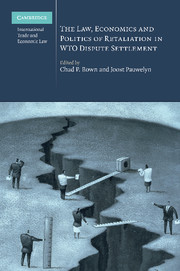Book contents
- Frontmatter
- Contents
- List of tables and figures
- Contributors
- Introduction: trade retaliation in WTO dispute settlement: a multi-disciplinary analysis
- PART I Background and goal(s) of WTO retaliation
- PART II A legal assessment after ten arbitration disputes
- PART III An economic assessment after ten arbitration disputes
- PART IV The domestic politics and procedures for implementing trade retaliation
- 8 The United States' experience and practice in suspending WTO obligations
- 9 The European Community's experience and practice in suspending WTO obligations
- 10 The politics of selecting trade retaliation in the European Community: a view from the floor
- 11 Canada's experience and practice in suspending WTO obligations
- 12 Is retaliation useful? Observations and analysis of Mexico's experience
- 13 Procedures for the design and implementation of trade retaliation in Brazil
- 14 Retaliation in the WTO: the experience of Antigua and Barbuda in US–Gambling
- PART V Problems and options for reform
- PART VI New frontiers and lessons from other fields
- Index
12 - Is retaliation useful? Observations and analysis of Mexico's experience
Published online by Cambridge University Press: 26 February 2010
- Frontmatter
- Contents
- List of tables and figures
- Contributors
- Introduction: trade retaliation in WTO dispute settlement: a multi-disciplinary analysis
- PART I Background and goal(s) of WTO retaliation
- PART II A legal assessment after ten arbitration disputes
- PART III An economic assessment after ten arbitration disputes
- PART IV The domestic politics and procedures for implementing trade retaliation
- 8 The United States' experience and practice in suspending WTO obligations
- 9 The European Community's experience and practice in suspending WTO obligations
- 10 The politics of selecting trade retaliation in the European Community: a view from the floor
- 11 Canada's experience and practice in suspending WTO obligations
- 12 Is retaliation useful? Observations and analysis of Mexico's experience
- 13 Procedures for the design and implementation of trade retaliation in Brazil
- 14 Retaliation in the WTO: the experience of Antigua and Barbuda in US–Gambling
- PART V Problems and options for reform
- PART VI New frontiers and lessons from other fields
- Index
Summary
This contribution is about Mexico's decisions on whether or not to use those provisions in international trade law, both multilateral and regional (WTO and preferential trade agreements), allowing it to retaliate. I analyse only cases where Mexico is the complainant. It has been faced with a decision five times on whether or not to take retaliation.
Section 1 presents the observations and provides the relevant data. Those cases where Mexico decided to retaliate allow us to measure the extent to which this choice enhanced the complainant's bargaining power. Also, it presents the selection of goods Mexico chose for retaliation. The cases where Mexico decided not to retaliate complement the picture by providing the political economy considerations. Section 2 presents our analysis of the data. We argue that the chocolate cake scenario – the defendant retains more chocolate by facing retaliation than by complying with the law of the contract or compensating otherwise – significantly diminishes the effectiveness of retaliation and provides negative economic incentives for compliance and compensation. The sensitivity of the goods/services subject to the dispute influences the position of the defendant and this has a direct impact on the use or otherwise of retaliation and on the outcome of the case. But more data would be needed to better understand how far this conclusion can be taken. Also, Mexico decided not to resort to retaliation in a number of cases, preferring a more amicable position, where the defendant has greater control of the outcome. The contribution also touches upon the selection of the goods subject to retaliatory measures and presents some relevant considerations.
- Type
- Chapter
- Information
- Publisher: Cambridge University PressPrint publication year: 2010
- 1
- Cited by



